Do Protein Shakes Cause Constipation? (Common Causes Explained)
Author:
Unlock your full potential by engaging with our experts and community! Have questions about your fitness journey or looking for expert advice on weightlifting techniques? Don’t hesitate — leave a comment below and Oleksandr Maksymenko will provide a personalized answer and insights to help you reach your goals.
Torokhtiy is reader-supported. Some links are affiliate links, and we may earn a commission at no extra cost to you. See our disclosure page for details.
Do protein shakes cause constipation? This topic has become widely debated among users of protein powders. Despite the benefits that protein shakes offer, many individuals have reported experiencing digestive issues, including constipation after consuming them.
This article aims to discuss possible causes of constipation and to determine whether there is evidence to support the notion.
Do protein shakes cause constipation? There is no direct evidence, but they are more likely to cause diarrhea through lactose/milk protein intolerance, or additional ingredients in protein powder that cause food intolerances. However, some components of milk-based protein powders may contribute to constipation, although this has not been proven.
Constipation is a common digestive issue. This functional gastroenterological disorder has a high prevalence in the world. In fact, up to 27% of the world’s population suffers from it.
First, you need to make sure that you really have a problem with constipation, which can worsen after you drink a protein shake. Constipation is a disorder in which the following is observed:
- Less than 3 bowel movements per week,
- Very hard, dry, or lumpy stool,
- Difficulties with defecation, including pain and difficult passage of stool,
- A feeling of an unfinished act of defecation.

Do Protein Shakes Cause Constipation? (Causes & How To Fix)
In fact, it is very difficult to give a clear answer to the question “do protein shakes make you constipated”, as this condition can have many primary and secondary causes. Primary causes includes:
- Slow movement of fecal masses through the colon,
- Evacuation disorders,
- Functional gastrointestinal disorders, like irritable bowel syndrome (constipation-predominant subtype, or IBS type C).
Secondary causes and risk factors includes:
- Aging,
- Being a woman (men have faster colonic transit than women),
- Medications,
- Problems of a mental or psychological profile (such as depression),
- Ignoring the urge to go to the bathroom.
Diet and lifestyle-related causes that can lead to constipation include:
- Not enough fiber in the diet,
- Not drinking enough fluids,
- High protein low-carb diet,
- Sedentary lifestyle,
- Obesity.
So can protein powder cause constipation on its own – isolated from other factors and causes?
Protein supplements come in many different types and sources, including dairy-based supplements that contain milk proteins. And while in children constipation may be the result of an allergy to cow’s milk proteins, the possible link between dairy and constipation remains understudied in adults.
In fact, the consumption of dairy products is associated with a reduced risk of constipation. However, keep in mind that only milk, yogurts, and cheeses were studied, and protein supplements were not.
Below are possible (theoretical) reasons why protein may contribute to constipation.
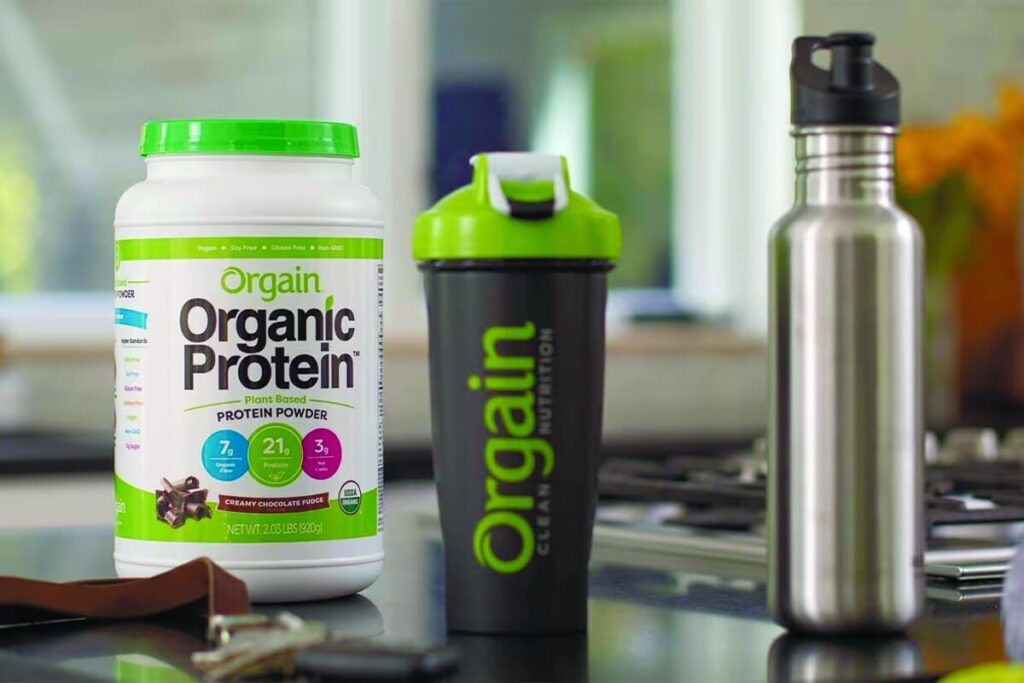
1. Specific Milk Proteins
Some studies have shown that a particular type of dairy protein (namely A1 Beta-casein) can slow gastrointestinal transit. In simple words, the movement of intestinal masses can slow down. Therefore, if you consume casein or milk protein that contains casein proteins, it may be contributing to the problem of constipation. However, this does not apply to whey protein supplements, because it contains other varieties of milk proteins.
2. Interaction of Milk Fats With Calcium
When calcium interacts with saturated milk fats in the intestinal lumen, the process of saponification (soap formation) occurs, which can result in hardening of feces. And while dairy-based protein supplements are usually low in fat per serving (typically 0-3 grams), this can be factored into the overall picture.
3. Lactose Intolerance
Milk-based protein supplements contain lactose, which is not well digested by everyone. This is especially true for milk protein concentrate and whey protein concentrate, which have more lactose than isolates.
Although in 70% of cases lactose intolerance may cause the opposite problem – diarrhea, for 30% of people, lactose intolerance can present with constipation, which is connected with methane produced by gut bacteria.
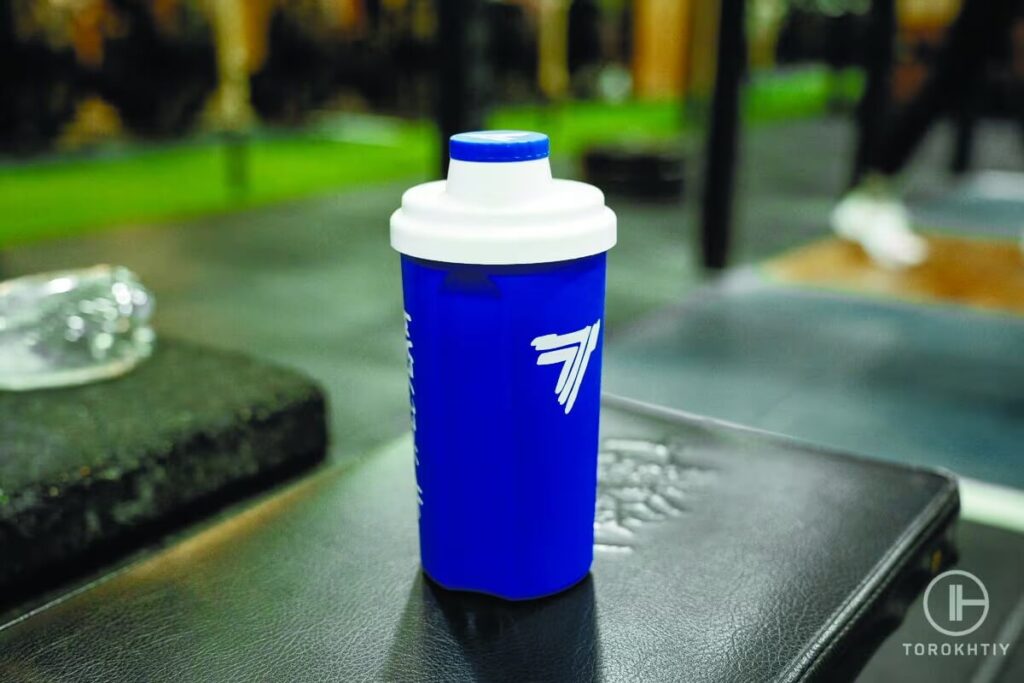
4. How to Fix the Problem if the Cause Is a Protein Shake?
If you clearly observe that after consuming a dairy-based protein shake you have a problem with constipation, try to give up this type of supplement or switch to the same protein from a different brand. Also, if you use casein, replace it with whey protein.
Another great option is to replace milk-based protein with plant-based protein. In this case, if the problem is related to milk protein, lactose intolerance or milk fats, it will be solved or at least eliminated. This change could be your protein shake constipation relief.
Main Dietary Factors That Can Cause Constipation
While protein shakes are not directly linked to constipation, there are several dietary factors that have a clear connection to the problem. They include:
1. High-Protein Low Carb Diets
If you eat a lot of protein, especially of animal origin (lots of meat and dairy products), this sets the stage for two interrelated problems:
- There are not enough carbohydrates from whole grains and fruits, which could take the calories from protein foods,
- Lack of fiber due to the exclusion or significant reduction of dietary fiber sources: whole grains and / or fruits.
Keep in mind that animal protein products (meat, poultry, fish, eggs, and dairy products) are not sources of fiber. Therefore, eating large amounts of protein from these foods without significant amounts of whole grains, fruits, vegetables, and legumes create conditions for developing constipation or compounding the problem if you already have it.
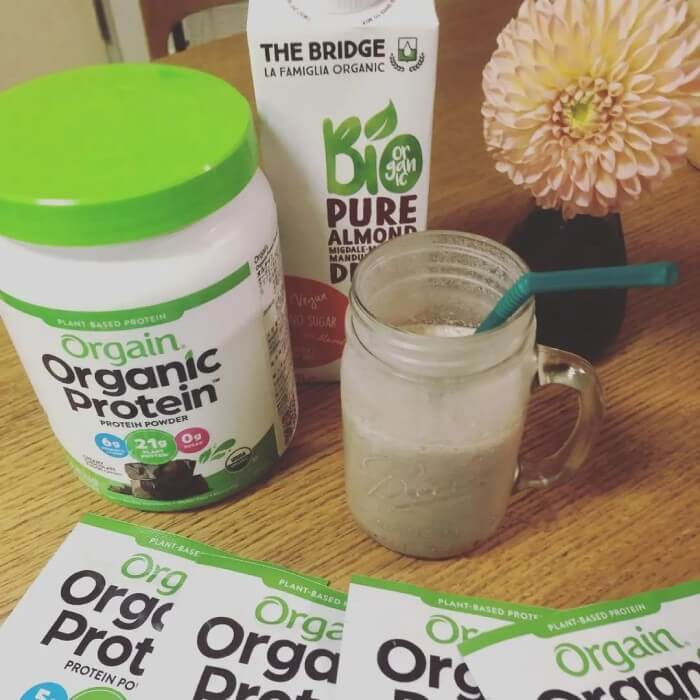
2. Insufficient Fiber Intake
A lack of dietary fiber can significantly contribute to the problem of constipation. There are different types of fiber, and each can help with constipation in its own way. One type of fiber binds to water and forms a gel-like substance that softens the stool, while another type irritates the intestinal lining and stimulates stool movement.
3. Insufficient Fluids Intake
In order for the stool to be soft and easier to pass through the intestines, we should drink enough water. However, many people are simply too lazy to drink an extra glass of water.
How to ease constipation from key dietary-related causes:
- Make sure you get enough fiber. Eating a diet rich in legumes, fruits, vegetables, and whole grains, can help alleviate constipation. Fiber needs for adults are around 30 grams per day. You don’t need to calculate, just eat several servings of fruits, vegetables and whole grains every day, plus regularly incorporate legumes into your diet. Add fiber-rich foods gradually, or your gastrointestinal tract will respond with gas, bloating and discomfort. And keep in mind that recommendations may vary depending on the specific situation. In some people increasing fiber may even make their constipation worse.
- Drink enough water. The easiest way to know if you are drinking enough fluids is to look at the color of your urine. If its shade resembles lemonade diluted with water (barely yellow), you drink enough. Also, keep in mind that if you increase the amount of fiber, you should also simultaneously increase the volume of fluid you drink to allow the fiber to do its job properly. Increasing fiber without additional fluids may actually make constipation worse rather than solving it.
- Do not overeat animal protein. The best option is to get part of the protein from meat, poultry, fish and eggs, another part – from Greek yogurt or protein shake (which provides a liquid in addition to protein), and another part – from legumes (which will provide a large portion of fiber in addition to plant-based protein).
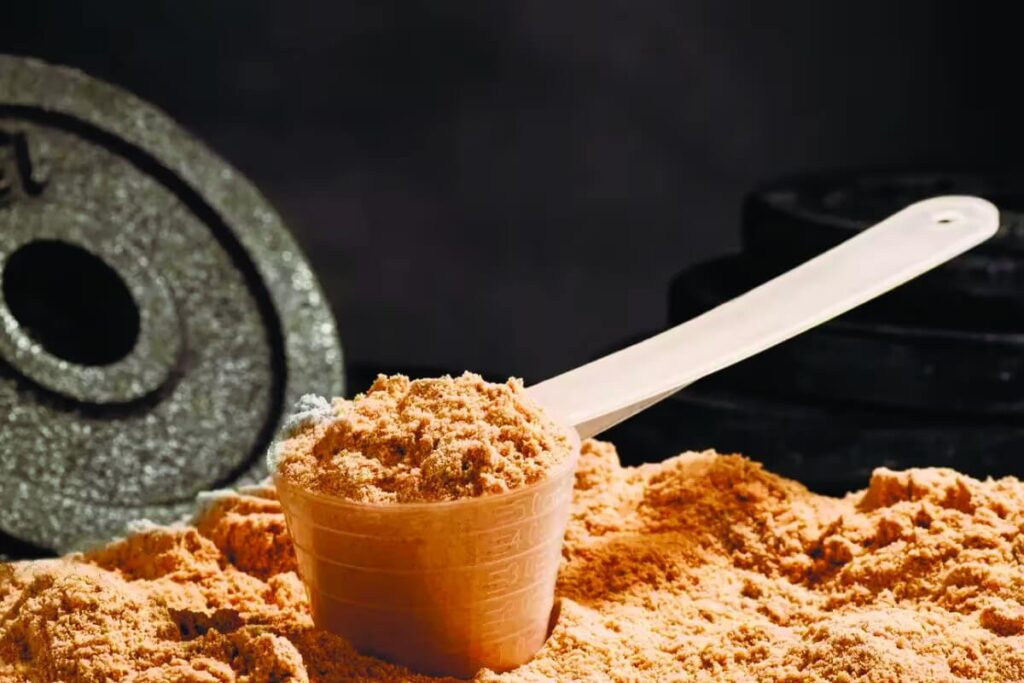
Considerations for Protein That Doesn’t Cause Constipation
1. Opt For Whey Protein Isolate
One type of protein that people often have questions about regarding its impact on digestion is whey protein. Many wonder if it could be a culprit in causing constipation and wonder “Does whey protein cause constipation?”
As already mentioned, components contained in milk-based protein powders (milk fat and lactose) and specifically in casein (milk fat, lactose and A1 Beta-casein) can contribute to constipation. Therefore, in order to exclude the influence of these components, whey protein isolate with minimum carbs and fats per serving is a recommended option.
Unlike whey concentrate, whey protein isolate undergoes additional filtration steps that minimize the amount of lactose and fat. You can even find products with 0 g of carbohydrates (and lactose) and 0 g of fat.
2. Look for a Plant-Based Protein Supplement
If you look for protein powder that doesn’t cause constipation, pay attention to vegan proteins that do not contain any of the milk protein components that may contribute to the problem. Therefore, choosing a vegan protein powder, we automatically exclude even the potential likelihood of exposure to the above components.
Another advantage of vegan protein powders is that, unlike dairy-based supplements, they usually contain a significant amount of fiber per serving.
We recommend Orgain Organic Protein Powder as a great plant-based protein. It contains a mixture of pea and rice proteins, which perfectly complement each other’s amino acid profile. It is a great option for individuals who are looking for a healthy and convenient way to boost their protein intake without components of dairy origin.
Each serving of Orgain Organic Protein Powder provides 21 grams of protein, which makes it a nutritious and filling addition to any meal. As a bonus, which you will not get from dairy-based proteins – a whooping 5.2-6.4 mg of iron per serving (depending on flavor)! No added sugar, no dairy, no lactose!
This powder is easy to mix and tastes great when added to smoothies, baked goods, and other recipes. With its exceptional taste, quality ingredients, and overall nutritional profile, Orgain Organic Protein Powder is the perfect choice for anyone looking to improve their daily nutrition.
3. Orgain Protein Powder
4. Try Protein Supplement With Sugar Alcohols
Sugar alcohols, especially sorbitol and mannitol, are known for their laxative effect when consumed in amounts that exceed the individual threshold. Therefore, if you see these sugar alcohols in the ingredients list of protein supplement, you can try this product.
And while for people without constipation these sugars can create the opposite problem (diarrhea), for some people with chronic constipation (for example, constipation-predominant subtype of irritable bowel syndrome), sorbitol and mannitol can be beneficial.
5. Keep Experimenting and Trying New Products
In general, protein supplements are unpredictable for our gastrointestinal tract. Some people have to change several proteins from different brands until they find their perfect product that does not cause problems.
Therefore, if you want to have a source of protein at hand in a convenient form, you can experiment and try new products until you find yours. To do this, it is best to buy the smallest package available to assess whether taking a particular protein supplement will worsen the situation with constipation.
You can also change the form of your protein shake. For example, try ready-to-drink protein shakes like Premier Protein. And if you wonder does Premier Protein cause constipation, you need to try it to assess your individual reaction.
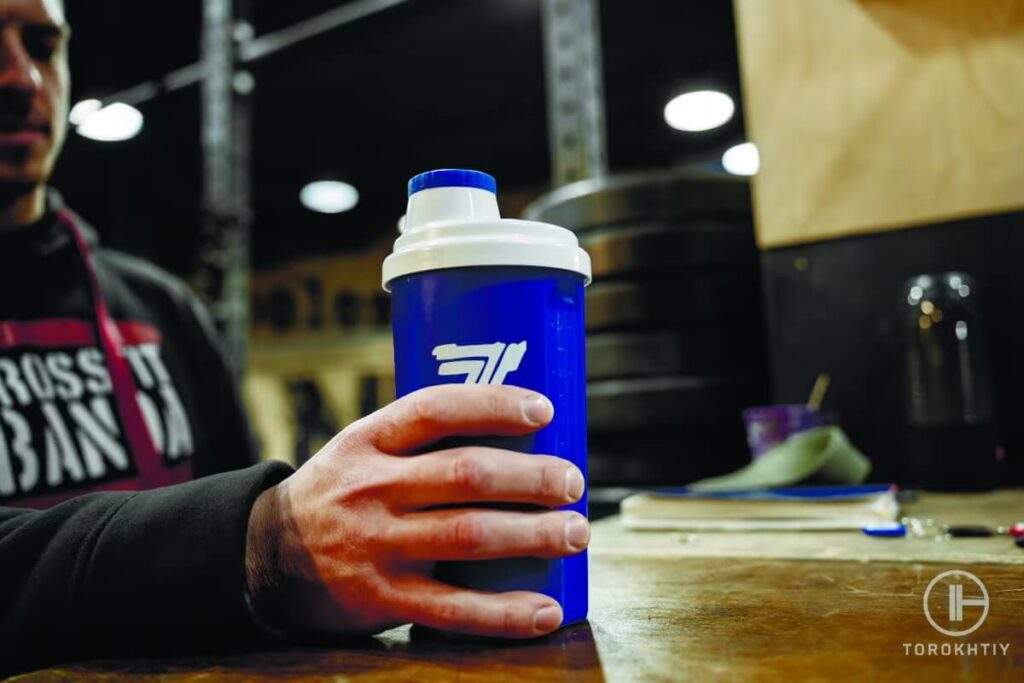
FAQ
Does protein affect bowel movement?
Any meal affects bowel movements. This is a normal physiological reaction called the gastrocolic reflex, as a result of which in response to meal intake food remains move through the large intestine in the direction of the rectum. Depending on the individual, this reflex can be weak, moderate or strong.
Are protein shakes good for pooping?
It depends on the specific person and how his gastrointestinal tract functions. It is impossible to generalize the effects of protein shakes on all people, because everyone reacts in their own way. In addition, we can react differently to different types of proteins.
Conclusion
There is no evidence that protein shakes are the cause of constipation. However, some components of milk-based proteins can contribute to the occurrence or complication of an existing problem of constipation, which is not related to protein supplements.
Keep in mind that constipation is a multifactorial problem, so it is very difficult to identify exactly what is the key cause. A protein shake can be just a small piece of the overall puzzle. Make your overall diet a priority, eat plenty of fruits, vegetables, and whole grains, drink plenty of fluids, do not rely on high-protein diets and meat, and exercise regularly. And if you have a problem with constipation, it is best to consult a gastroenterologist.
Please share your experience with protein powders and their effect on digestion and ask any questions you may have in the comments below.
Also read:
- Muscle Milk vs Whey Protein
- Milk Protein vs Whey Protein
- Can Protein Shakes Cause Diarrhea
- Milk With Protein Powder
- Hemp and Pea Protein Powder
- Protein Shake vs Protein Powder
- Whey Protein vs Hemp Protein
- Creatine For Women
References:
- Definition & Facts for Constipation // National Institute of Diabetes and Digestive and Kidney Diseases: https://journals.sagepub.com/doi/10.1177/02601060211004784
- Irritable Bowel Syndrome (IBS) // GI Society: https://badgut.org/information-centre/a-z-digestive-topics/ibs/
- Nutrition and healthy eating // Mayo Clinic: https://www.mayoclinic.org/healthy-lifestyle/nutrition-and-healthy-eating/expert-answers/high-protein-diets/faq-20058207
- Associations between dairy consumption and constipation in adults: A cross-sectional study // SAGE : https://journals.sagepub.com/doi/10.1177/02601060211004784
- Can Lactose Intolerance Be a Cause of Constipation? A Narrative Review // National Library of Medicine: https://www.ncbi.nlm.nih.gov/pmc/articles/PMC9105309/
- The Nutrition Source // Harvard T.H. Chan: https://www.hsph.harvard.edu/nutritionsource/carbohydrates/fiber/
- Fibre: Food Fact Sheet // BDA: https://www.bda.uk.com/resource/fibre.html
- Common causes of constipation // Harvard Health Publishing: https://www.health.harvard.edu/diseases-and-conditions/common-causes-of-constipation
- Fiber, digestion and health // Gannet: https://health.cornell.edu/sites/health/files/pdf-library/fiber-digestion-health.pdf
Why Trust Us?
With over 20 years in Olympic weightlifting, strength training, nutrition coaching, and general fitness our team does its best to provide the audience with ultimate support and meet the needs and requirements of advanced athletes and professional lifters, as well as people who strive to open new opportunities and develop their physical capabilities with us.
By trusting the recommendations of our certified experts in coaching, nutrition, and sports training programming, as well as scientific consultants, and physiotherapists, we provide you with thorough, well-considered, and scientifically proven content. All the information given in the articles concerning workout programming, separate exercises, and athletic performance, in general, is based on verified data.
The product testing process is described in more detail here.
Author: Oleksandr Maksymenko
Certified Sports Nutritionist,
MSc Sports Dietetics
Specializing in: Weight management, Fitness / Sports nutrition
Oleksandr is a professional fitness nutritionist certified by the Fitness Professional Association (FPA). He follows the principles of evidence-based dietetics and fosters a healthy relationship with food in his clients, ensuring there are no strict prohibitions on their favorite foods or frequent lapses. His primary goal is not only to achieve results for you but also to sustain them over the long term, all while enjoying tasty and delicious food.



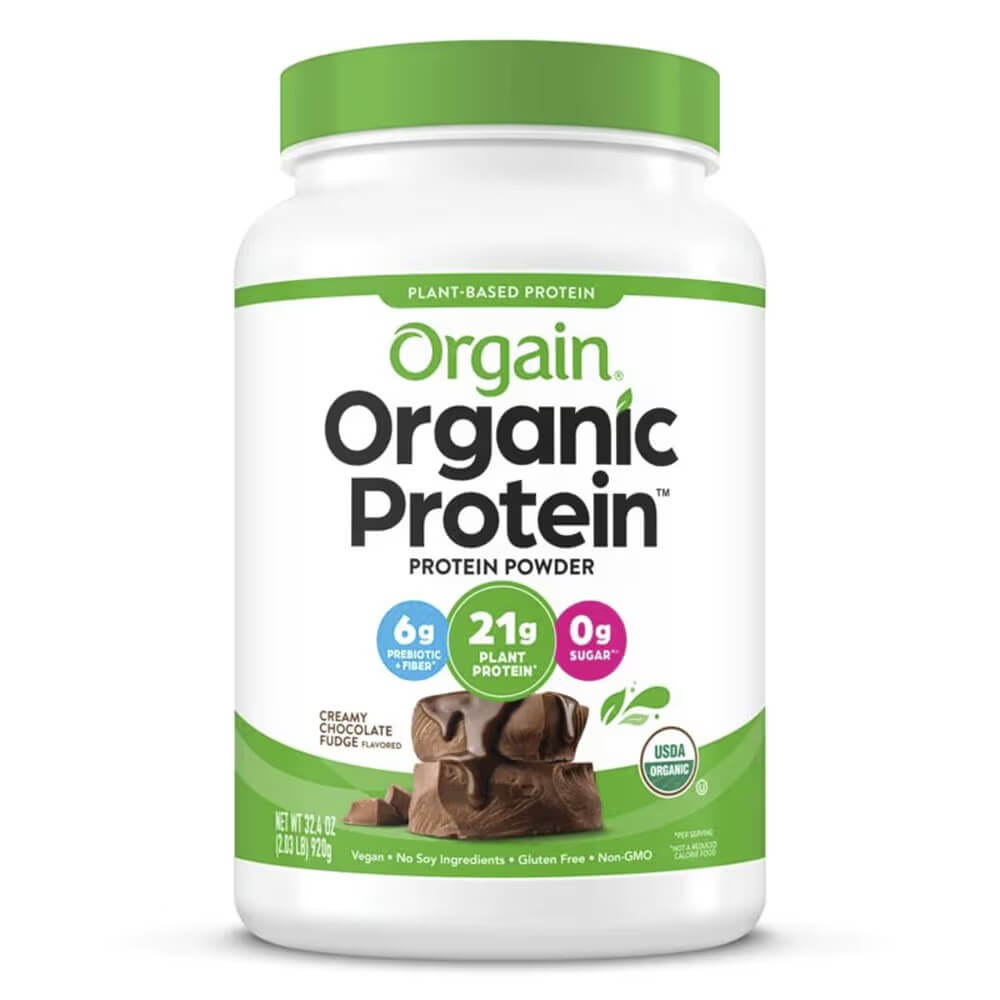
What about soy protein? Not a word about it but other plant proteins? Somebody answer this.